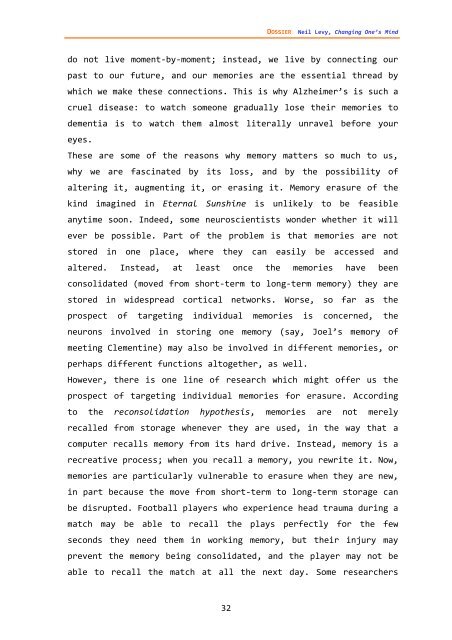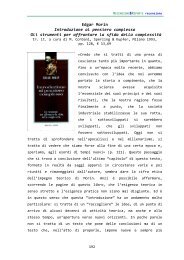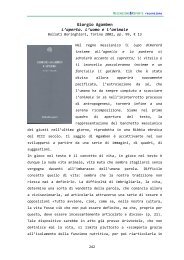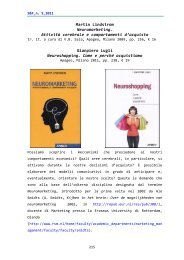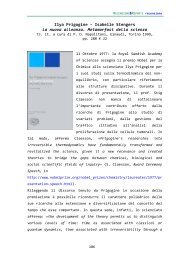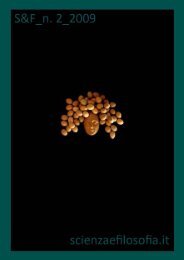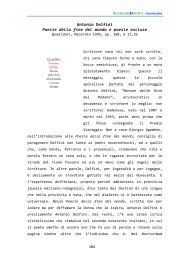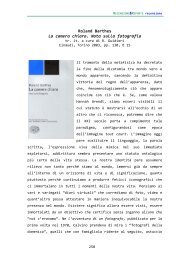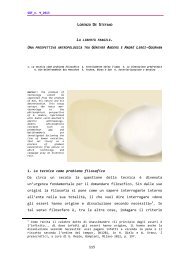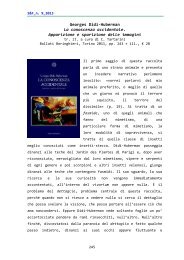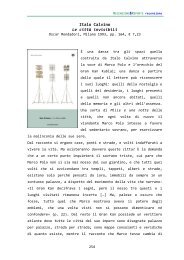- Page 2 and 3: S&F_ scienza&filosofia.itCOMITATO S
- Page 4 and 5: Da questa mission la rivista trova
- Page 6 and 7: S&F_n. 5_2011INDICE
- Page 9 and 10: S&F_n. 5_2011DOSSIER
- Page 11 and 12: S&F_n. 5_2011ALDO TRUCCHIONEUROETIC
- Page 13 and 14: S&F_n. 5_2011ricerca in biblioteca
- Page 15 and 16: S&F_n. 5_2011esplicitamente ispirat
- Page 17 and 18: S&F_n. 5_2011circolano delle sostan
- Page 19: S&F_n. 5_2011Per di più studi come
- Page 22 and 23: DOSSIER Aldo Trucchio, Neuroetica:
- Page 24 and 25: DOSSIER Aldo Trucchio, Neuroetica:
- Page 26 and 27: DOSSIER Aldo Trucchio, Neuroetica:
- Page 28 and 29: DOSSIER Aldo Trucchio, Neuroetica:
- Page 30 and 31: DOSSIER Aldo Trucchio, Neuroetica:
- Page 32 and 33: DOSSIER Neil Levy, Changing One’s
- Page 36 and 37: DOSSIER Neil Levy, Changing One’s
- Page 38 and 39: DOSSIER Neil Levy, Changing One’s
- Page 40 and 41: DOSSIER Neil Levy, Changing One’s
- Page 42 and 43: DOSSIER Neil Levy, Changing One’s
- Page 44 and 45: DOSSIER Neil Levy, Changing One’s
- Page 46 and 47: DOSSIER Neil Levy, Changing One’s
- Page 48 and 49: DOSSIER Neil Levy, Changing One’s
- Page 50 and 51: DOSSIER Neil Levy, Changing One’s
- Page 52 and 53: DOSSIER G. Corbellini - E. Sirgiova
- Page 54 and 55: DOSSIER G. Corbellini - E. Sirgiova
- Page 56 and 57: DOSSIER G. Corbellini - E. Sirgiova
- Page 58 and 59: DOSSIER G. Corbellini - E. Sirgiova
- Page 60 and 61: DOSSIER G. Corbellini - E. Sirgiova
- Page 62 and 63: DOSSIER G. Corbellini - E. Sirgiova
- Page 64 and 65: DOSSIER G. Corbellini - E. Sirgiova
- Page 66 and 67: DOSSIER Umberto di Porzio, Il cerve
- Page 68 and 69: DOSSIER Umberto di Porzio, Il cerve
- Page 70 and 71: DOSSIER Umberto di Porzio, Il cerve
- Page 72 and 73: DOSSIER Umberto di Porzio, Il cerve
- Page 74 and 75: DOSSIER Umberto di Porzio, Il cerve
- Page 76 and 77: DOSSIER Umberto di Porzio, Il cerve
- Page 78 and 79: DOSSIER Umberto di Porzio, Il cerve
- Page 80 and 81: DOSSIER Silvano Tagliagambe, L’et
- Page 82 and 83: DOSSIER Silvano Tagliagambe, L’et
- Page 84 and 85:
DOSSIER Silvano Tagliagambe, L’et
- Page 86 and 87:
DOSSIER Silvano Tagliagambe, L’et
- Page 88 and 89:
DOSSIER Silvano Tagliagambe, L’et
- Page 90 and 91:
DOSSIER Silvano Tagliagambe, L’et
- Page 92 and 93:
DOSSIER Silvano Tagliagambe, L’et
- Page 94 and 95:
DOSSIER Silvano Tagliagambe, L’et
- Page 96 and 97:
DOSSIER Silvano Tagliagambe, L’et
- Page 98 and 99:
DOSSIER Silvano Tagliagambe, L’et
- Page 100 and 101:
DOSSIER Nicola Canessa, Il cervello
- Page 102 and 103:
DOSSIER Nicola Canessa, Il cervello
- Page 104 and 105:
DOSSIER Nicola Canessa, Il cervello
- Page 106 and 107:
DOSSIER Nicola Canessa, Il cervello
- Page 108 and 109:
DOSSIER Nicola Canessa, Il cervello
- Page 110 and 111:
DOSSIER Nicola Canessa, Il cervello
- Page 112 and 113:
DOSSIER Nicola Canessa, Il cervello
- Page 114 and 115:
S&F_n. 5_2011STORIA
- Page 116 and 117:
STORIA Massimo Vittorio, L’intell
- Page 118 and 119:
STORIA Massimo Vittorio, L’intell
- Page 120 and 121:
STORIA Massimo Vittorio, L’intell
- Page 122 and 123:
STORIA Massimo Vittorio, L’intell
- Page 124 and 125:
STORIA Massimo Vittorio, L’intell
- Page 126 and 127:
STORIA Massimo Vittorio, L’intell
- Page 128 and 129:
S&F_n. 5_2011ANTROPOLOGIE
- Page 130 and 131:
ANTROPOLOGIE Ines Adornetti, Natura
- Page 132 and 133:
ANTROPOLOGIE Ines Adornetti, Natura
- Page 134 and 135:
ANTROPOLOGIE Ines Adornetti, Natura
- Page 136 and 137:
ANTROPOLOGIE Ines Adornetti, Natura
- Page 138:
ANTROPOLOGIE Ines Adornetti, Natura
- Page 141 and 142:
S&F_n. 5_2011PAOLO SOMMAGGIODALL’
- Page 143 and 144:
S&F_n. 5_2011Eppure, proprio i risu
- Page 145 and 146:
S&F_n. 5_2011La (pseudo‐)scelta d
- Page 147 and 148:
S&F_n. 5_2011poiché non è possibi
- Page 149 and 150:
S&F_n. 5_2011costante cambiamento.
- Page 151 and 152:
S&F_n. 5_2011Proprio dal superament
- Page 153 and 154:
S&F_n. 5_2011rapporto tra umano e p
- Page 155 and 156:
S&F_n. 5_2011FIORELLA BATTAGLIAQUAL
- Page 157 and 158:
S&F_n. 5_2011processi decisionali,
- Page 159 and 160:
S&F_n. 5_2011filosofi e teologi non
- Page 161 and 162:
S&F_n. 5_2011contraddizione. Questo
- Page 163 and 164:
S&F_n. 5_2011insomma la qualità de
- Page 165 and 166:
S&F_n. 5_2011la chiave che consente
- Page 167 and 168:
S&F_n. 5_2011TIMOTHY TAMBASSIIL PUZ
- Page 169 and 170:
S&F_n. 5_2011scientifiche, che si o
- Page 171 and 172:
S&F_n. 5_2011costruzioni teoriche,
- Page 173 and 174:
S&F_n. 5_2011discipline scientifich
- Page 175:
S&F_n. 5_2011determinata posizione
- Page 178 and 179:
COMUNICAZIONE Pasquale Napolitano,
- Page 180 and 181:
COMUNICAZIONE Pasquale Napolitano,
- Page 182 and 183:
COMUNICAZIONE Pasquale Napolitano,
- Page 184 and 185:
COMUNICAZIONE Pasquale Napolitano,
- Page 186 and 187:
COMUNICAZIONE Pasquale Napolitano,
- Page 188 and 189:
COMUNICAZIONE Pasquale Napolitano,
- Page 190 and 191:
COMUNICAZIONE Pasquale Napolitano,
- Page 192 and 193:
ARTE Pierpaolo Lauria, Primo Levi e
- Page 194 and 195:
ARTE Pierpaolo Lauria, Primo Levi e
- Page 196 and 197:
ARTE Pierpaolo Lauria, Primo Levi e
- Page 198 and 199:
ARTE Pierpaolo Lauria, Primo Levi e
- Page 200 and 201:
ARTE Pierpaolo Lauria, Primo Levi e
- Page 202 and 203:
ARTE Pierpaolo Lauria, Primo Levi e
- Page 205 and 206:
S&F_n. 5_2011RECENSIONI&REPORTS
- Page 207 and 208:
S&F_n. 5_2011quella che si respirav
- Page 209 and 210:
S&F_n. 5_2011concepito come preda d
- Page 211 and 212:
S&F_n. 5_2011neuroni specchio, conc
- Page 213 and 214:
S&F_n. 5_2011e non proposizionale d
- Page 215 and 216:
S&F_n. 5_2011sarebbe appunto quella
- Page 217 and 218:
S&F_n. 5_2011Martin LindstromNeurom
- Page 219 and 220:
S&F_n. 5_2011Richard Silberstein. R
- Page 221 and 222:
S&F_n. 5_2011marketing, e una certa
- Page 223 and 224:
S&F_n. 5_2011Neil LevyNeuroetica. L
- Page 225 and 226:
S&F_n. 5_2011si tenterà di compren
- Page 227 and 228:
S&F_n. 5_2011del tutto esplicitata
- Page 229 and 230:
S&F_n. 5_2011sgg.). Negli Stati Uni
- Page 231 and 232:
S&F_n. 5_2011piuttosto che a un’a
- Page 233 and 234:
S&F_n. 5_2011o magari sulle cellule
- Page 235 and 236:
S&F_n. 5_2011compiti svolti in cond
- Page 237 and 238:
S&F_n. 5_2011ma una rivalutazione d
- Page 239 and 240:
S&F_n. 5_2011dover superare; una no
- Page 241 and 242:
S&F_n. 5_2011di biologia al Salk In
- Page 243 and 244:
S&F_n. 5_2011desumere la norma appa
- Page 245 and 246:
NORME REDAZIONALII testi vanno invi
- Page 247:
CitazioniLe citazioni nel testo pos


